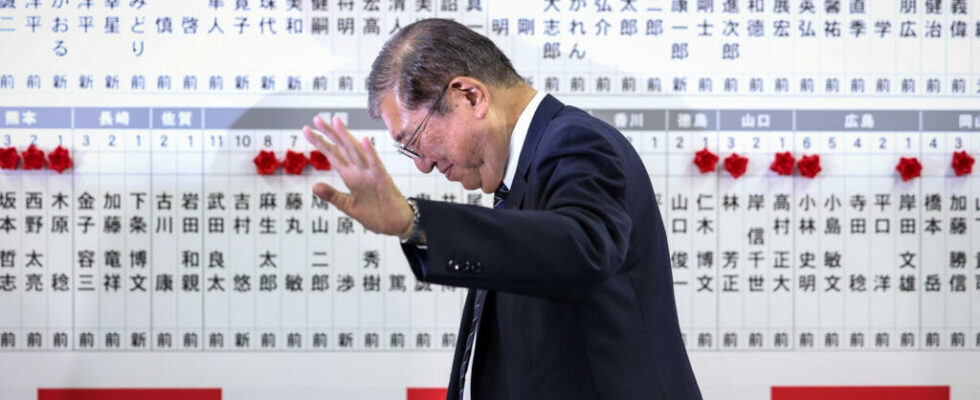Japanese Prime Minister Shigeru Ishiba recognized on Monday October 28 the “ distrust » and the “ anger » of voters the day after his heavy electoral defeat, but ruled out resigning. Arriving in power on October 1, he opted to promise “ fundamental reforms » within his party, the Liberal Democratic Party (PLD), tainted by a vast financial scandal.
4 mins
Following his arrival in power on October 1, Shigeru Ishiba had summoned anticipated legislativehoping to consolidate his power by strengthening the position of his Liberal Democratic Party (PLD), which governs the Japan almost continuously for seven decades. But according to projections by the national television channel NHK and pending official results, the PLD did not reach the absolute majority of 233 seats on his own, for the first time since 2009.
Worse, these figures suggest that the ruling coalition composed of the PLD and the small Komeito party also failed to secure control of half of the 465 seats in the lower house. The PLD won 191 seats and Komeito 24, according to NHK counts Monday morning. “ The biggest factor (of defeat), it is the suspicion, distrust and anger that have not faded on the problem of financing and politics “, admitted Shigeru Ishiba on Monday, promising a “ fundamental reform » on this subject.
Already penalized by the economic situation and high inflation, the PLD suffered from the fallout from an affair of “ slush funds » within it. Shigeru Ishiba, however, affirmed that he wanted to remain in office, in order to avoid creating ” a political vacuum “. “ I want to fulfill my duty, which is to protect people’s lives, to protect Japan “, he told the press. Conversely, Shinjiro Koizumi, responsible for elections within the PLD, resigned from his position on Monday.
Also readEarly legislative elections in Japan: a rare election with high stakes
A minority government that rules out any coalition enlargement
Analysts doubt the ability of the very divided opposition to form an alliance itself. Shigeru Ishiba will therefore now have to lead a minority government (without an absolute majority in Parliament), at the risk of having difficulty getting his texts adopted, or look for new coalition partners.
Shigeru Ishiba clarified on Monday that he did not wish “ at this stage » expand its coalition, preferring discussions according to the texts with the opposition parties. However, the Prime Minister could see his position contested within the PLD, including certain executives, supporters of the former Prime Minister Shinzo Abe, “had been mistreated by Mr. Ishiba and could therefore seize the opportunity to take revenge », Estimated Yu Uchiyama, professor of political science at the University of Tokyo.
But “As the PLD has lost a considerable number of seats, they may decide to support Ishiba for now, thinking that this is not the time to engage in infighting ”, according to Mr. Uchiyama.
The center-left opposition on the rise
During the last general elections, in 2021, the PLD obtained a majority with 259 seats in the powerful lower house of Parliament. Komeito won 32, establishing a comfortable majority. If the official results confirm it, the loss of the majority by the LDP will be the worst result since its last loss of power, in 2009. It was then brought back to business in 2012 by a large victory for Shinzo Abe.
Opinion polls before the election had suggested that in many constituencies, LDP candidates were neck and neck with those of the Constitutional Democratic Party (PDC). This main opposition group, placed on the center-left of the political spectrum, is led by the popular former Prime Minister Yoshihiko Noda.
The PDC, the second largest group in Parliament, seems to have made considerable progress, with the NHK counting 148 seats against 96 previously. “ Voters chose the party best able to promote political reforms », welcomed Yoshihiko Noda on Sunday evening, adding that “ PLD-Komeito governance cannot continue “.
The legislative elections also mark the progress of smaller groups, with the People’s Democratic Party (center) quadrupling its number of seats according to NHK. The Reiwa Shinsengumi, a populist party founded by a former actor, would go from 3 to 9 seats after promising to abolish the consumption tax and increase pensions. This while the anti-immigration and nationalist Conservative Party of Japan won its first three seats.
Finally, the number of women parliamentarians elected to the lower house could reach a record level of 73, again according to the public channel NHK.
